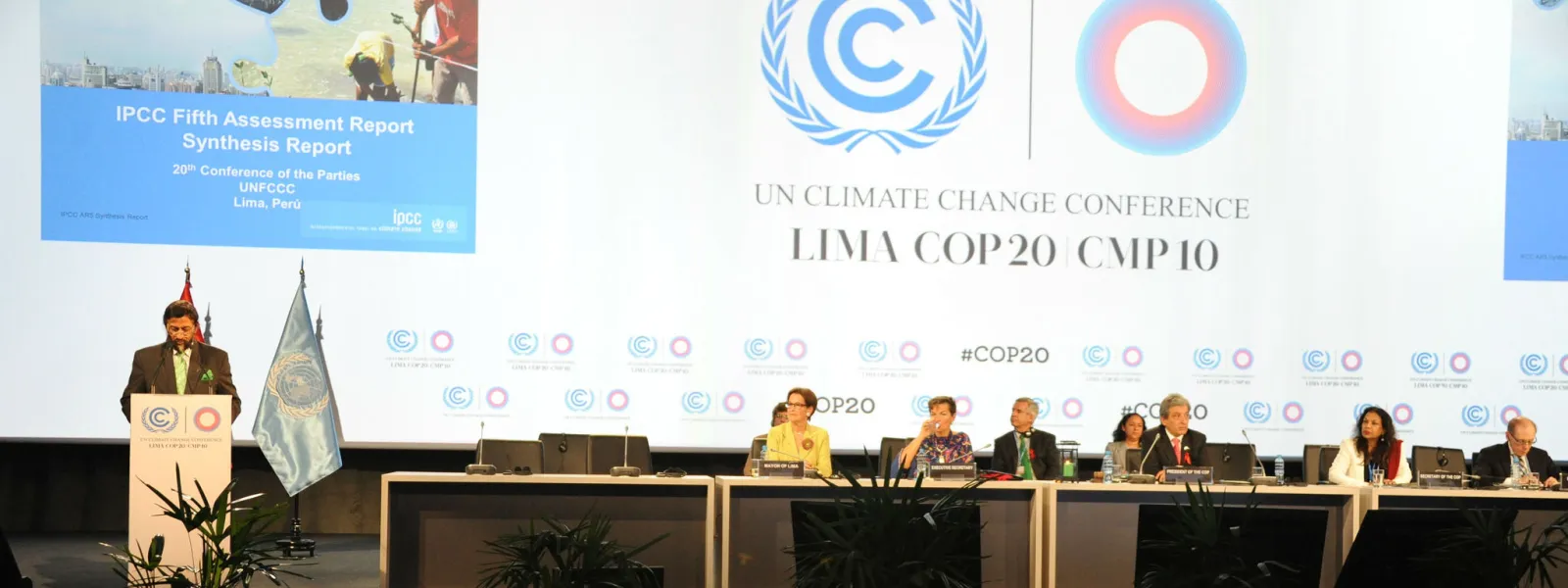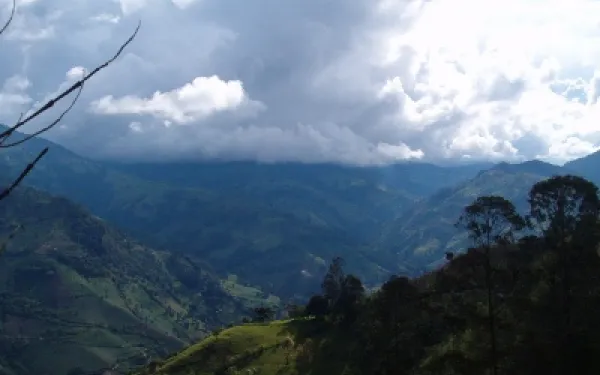
Project
Photo: UNFCCCMonitoring the UN Climate Negotiations
As changes in climate become more extreme, their affects are being hardest felt throughout developing countries. Since 1994, the United Nations Framework Convention on Climate Change has laid out actions to limit the increase of global average temperatures and confront the impacts of climate change.
The States that are Parties to the Convention meet every year in the so-called Conference of the Parties (COP) to review their commitments, the progress made in fulfilling them, and pending challenges in the global fight against the climate crisis.
At COP21 in 2015, they adopted the Paris Agreement, which seeks to strengthen the global response to the climate emergency, establishing a common framework for all countries to work on the basis of their capacities and through the presentation of Nationally Determined Contributions (NDC) that will:
- Limit the increase in global temperatures to 2°C compared to pre-industrial levels and continue efforts to limit it to 1.5°C;
- Increase the capacity of countries to adapt to the impacts of climate change; and
- Ensure that financing responds to the goal of reducing greenhouse gas emissions.
Our focus areas
THE CLIMATE CRISIS AND HUMAN RIGHTS
The climate crisis, due to its transversal character, has repercussions in various fields, geographies, contexts and people. In this regard, the Preamble to the Paris Agreement states that it is the obligation of States to "respect, promote and fulfill their respective obligations on human rights, the right to health, the rights of indigenous peoples, local communities, migrants, children, persons with disabilities and people in vulnerable situations and the right to development, as well as gender equality, the empowerment of women and intergenerational equity."
AIDA at the COP
COP25: Chile-Madrid 2019
At COP25 in Madrid, Spain, we advocated for the inclusion of the human rights perspective in various agenda items. We promoted the incorporation of broad socio-environmental safeguards in the regulation of Article 6 of the Paris Agreement, which refers to carbon markets. We closely followed the adoption of the Gender Action Plan, as well as the Santiago Network, created "to catalyze technical assistance […] in developing countries that are particularly vulnerable to the adverse affects of climate change." We also encouraged the inclusion of ambitious and measurable targets for the reduction of short-lived climate pollutants in the climate commitments of States.
Related projects
Groups support challenge to dam project in Panama for violating indigenous rights
Amicus brief highlights unlawful consultation process. Mexico City, Mexico – Civil society organizations filed an amicus brief yesterday in Panama’s Supreme Court of Justice in support of a challenge by indigenous people to the environmental review of the Barro Blanco hydroelectric dam. Supporting a lawsuit filed by the Environmental Advocacy Center, Panamá (CIAM), the Interamerican Association for Environmental Defense (AIDA), the Center for International Environmental Law (CIEL) and Earthjustice argue that the Panamanian government violated international law by approving the project without adequately consulting or obtaining the free, prior and informed consent of the affected Ngӓbe-Buglé indigenous peoples, and without adequately reviewing the environmental impacts to their lands. “Our lands and natural resources are the most important aspects of our culture, and we wish to thank the international organizations that are supporting our struggle to protect them,” said Goejet Miranda, President of a Ngäbe community movement to defend the Tabasará River from development projects. Once completed, the dam is projected to flood homes and religious, archaeological and cultural sites in the Ngӓbe-Buglé territories. The Barro Blanco dam will transform the Tabasará River from a vibrant source of food and water into a stagnant lake ecosystem, and will lead to the forced relocation of several families. Following a visit with indigenous communities in Panama last month, U.N. Special Rapporteur on the Rights of Indigenous Peoples James Anaya concluded that the government should have ensured adequate consultation with the Ngäbe people before authorizing the project. “Indigenous people have special protections under international law,” said CIEL senior attorney Alyssa Johl. “And in the case of Barro Blanco, Panama violated international law by ignoring the Ngäbe peoples’ rights to consultation and to free, prior and informed consent, which require states to ensure that indigenous peoples are actively engaged in, and take ownership of, decisions that affect their lives and livelihoods.” The amicus supports CIAM’s lawsuit seeking to nullify the resolution that approved the project’s environmental impact assessment (EIA) and to suspend construction of the dam until an adequate EIA has been conducted. “Given Panama’s international human rights obligations,” explained AIDAsenior attorney María José Veramendi, “we expect that the Court will rule in favor of the affected Ngäbe people, strengthening the protection of indigenous communities with respect to development projects in Panamá and contributing to the development of a strong and coherent jurisprudence on the issues of human rights and the environment in the region.” The Barro Blanco project has also received criticism related to its registration under the Clean Development Mechanism (CDM), a carbon-offsetting scheme established under the Kyoto Protocol. In theory, the CDM – with its dual objectives of reducing carbon emissions and achieving sustainable development – could be a valuable tool in the fight against climate change. However, among other problems, the CDM fails to ensure that its projects do not violate human rights. “Mechanisms to address climate change should do more than provide economic benefit for the companies developing the projects,” said Earthjustice attorney Abby Rubinson. “They must ensure protection of human rights and equitable solutions on the ground.” For more information view the amicus brief here.
Read more
How we protect Andean ecosystems from mining's impacts
Few places in the world are so vulnerable to environmental degradation from mining than Colombia. The country ranks second in coal reserves in South America and is home to what could be one of the largest gold mines in the Americas. This means it is imperative to deal with the environmental problems linked to mining. Paradoxically, Colombia has a rich ecology. This ranges from forests to fragile environments such as páramos, or high-altitude ecosystems that capture water from fog and supply it to lowlands. Both have a rich biodiversity that would suffer devastating impacts from mining. But it’s not just the environment. The ethnic and rural communities that rely on these natural resources for their livelihoods are the most susceptible to mining. AIDA has worked to protect these Andean ecosystems, which are vital sources of water. Due to a shift in national policy from agriculture to mining as Colombia’s economic and industrial priority, the threats of mining are intensifying. In response, AIDA has used political and legal strategies to strengthen and enforce environmental legislation in the country. We have turned to comparative and international law to clarify the country’s legal requirements and establish precedents for the creation of public policies that protect fragile environments from large-scale mining. In this effort, AIDA helped the Inter-Church Commission for Justice and Peace, a Colombian human rights group, to file a lawsuit against the Mandé Norte project of Muriel Mining Corp. in the northeastern department of Chocó. With the resolution of this case (see above, Spanish only), Colombia's Constitutional Court set a crucial precedent. It ruled that indigenous and tribal communities have the right to freely access information about the project and to express their prior consent for the construction of the mine, all while under the protection of national and international laws. Specifically, the court ordered the Colombian government to stop all work on the Mandé Norte mine until the company carried out extensive studies on the potential environmental impacts and made a new and adequate consultation of the affected communities. The Ministry of Interior and the mining company asked the court to reverse its decision. AIDA and other organizations submitted requests (see our interventions, Spanish only) to keep the ruling intact. This finally happened on March 12, 2012 when the court confirmed its decision (see the confirmation of the sentence, Spanish only). To the east of the Mandé Norte project, another such project is threatening the environment and communities in the Santander department. AIDA is working to stop the construction of Angostura, an open-pit gold mine that Canada’s Greystar Resources Ltd. – now called Eco Oro Minerals Corp. – plans to build in the Santurbán páramos, high-altitude wetlands that supply drinking water to 2.2 million Colombians and help to mitigate the effects of climate change. During the environmental licensing process for the project, AIDA helped to demonstrate that Colombia’s legal obligations as well as international norms prohibit mining in the páramos. Based on this argument, Colombia’s Ministry of Environment, Housing and Territorial Development rejected (Spanish only) the environmental impact assessment denied the environmental license for Angostura in May 2011. But as the decision didn’t cancel the mining licenses, Eco Oro said it would seek to build an underground mine. In January 2013, the ministry declared Santurbán a Regional Natural Park, a move that can prevent the development of mining concessions in páramos areas. Through all of this, we found evidence of violations to social and environmental standards in the national and international funding for the Angostura mine by the International Finance Corporation (IFC), an entity of the World Bank Group. Given the alleged noncompliance with these standards, we teamed up with the Center for International Environmental Law (CIEL) and MiningWatch Canada to submit a complaint to the Office of the Compliance Advisor Ombudsman (CAO), the independent complaints office of the IFC. We called for an audit of the project and a subsequent divestment. The CAO decided to audit the investment process. The outcome could set a precedent to ensure that the IFC does not finance mining in páramos, a key decision given that such initiatives are planned elsewhere in Colombia as well as in Ecuador and Peru. In addition to these efforts, AIDA has been actively involved in the debate (Spanish only) concerning a boundary demarcation of Colombia’s páramos as a way to protect these ecosystems. According to Colombian law, the geographical location and characteristics of páramo ecosystems must be mapped out to establish their legal perimeters. Once officially determined, the boundaries will provide the basis for conservation measures, in particular the prevention of activities that cause irreversible damage. Together with prestigious Colombian environmentalists and society as a whole, AIDA has taken action (Spanish only) to press the Ministry of Environment to endorse a demarcation based on scientific criteria by adopting a new atlas of the páramos drawn up by Colombian officials. At the same time, AIDA has worked with other environmental organizations to investigate La Colosa, a mining project that South Africa-based AngloGold Ashanti Ltd. plans to develop in the forest reserves and the large farmlands of Tolima, a central-western department of Colombia. In this case, we have sought a more active and informed participation of citizens and compliance with the highest environmental standards. AIDA also has joined forces with other organizations to file a suit with the goal of analyzing the constitutionality of Colombia’s National Mining Code. The Constitutional Court has set important precedents regarding the need to protect environmentally sensitive areas and the importance of the precautionary principle. It also has set a precedent for ensuring the independence of environmental authorities in regard to mining authorities when it comes to awarding environmental licenses for mining projects. In addition to Colombia, AIDA has been enlisted to help halt the construction of mines in Bolivia, Ecuador, Costa Rica, Mexico, Panama and elsewhere. To do this, AIDA has developed legal and scientific resources from our analysis of case studies and writing of reports. These resources can be useful for protecting the environment and the rural and indigenous communities that are the most affected by mining.
Read more
The bicycle: Can it be our principle mode of transport?
By Astrid Puentes Riaño, co-director, AIDA, @astridpuentes Have you ever thought that bicycles could be our main mode of transport, or is it already for you? I tell people that I cycle, and that I live in Mexico City! I love riding on two wheels for many reasons: it’s environmentally friendly, and it’s easy, fast, cheap and fun. Many times I’ve ridden past cars idling in traffic, leaving them behind as I arrive at my destination in less time than if I’d taken a car or bus. Although it seems incredible, I hardly ever take a car. This might seem crazy given that we are in the modern era and I live in Mexico City, but its doable. I use Ecobici, a public rental service for bicycles. It’s not perfect, but it works well enough. I’m not saying that bicycles should be the only option for everyone. It works for me because most of the destinations I ride to are within a reasonable distance. Of course, when I need to go somewhere with my two year old, I resort to other means of transport such as our family car. As we all know, the increasing use of bicycles and other zero-emission modes of transport help to combat climate change in our cities. Sustainable transport alone will not provide the panacea for solving global warming, but it does go a long way in reducing its impact. The case of The Netherlands Riding a bike, especially in Latin America, can sometimes be more of a challenge than an adventure. I found a BBC article that explains why some countries like The Netherlands use bicycles on a grand scale. The reasons why are surprisingly simple. The country has: Excellent bike path infrastructure, with enough space for everyone to cycle, including children. A bicycle-friendly culture: Motorists respect cyclists because in most cases they either know someone who is a cyclist or they cycle themselves. Strict traffic rules for everyone: Motorists and cyclists alike face hefty fines if they park poorly on the street, travel in the wrong direction or do not follow traffic light rules. Tolerant neighbors allow cyclists to park their bicycles outside their houses, which is clearly a safe place to leave them! How can this be achieved? An interesting aspect in the case of The Netherlands is that civil society pressure and the oil crisis were decisive factors that influenced a considerable change in the country’s transport system. Like most countries in the 1950s and 1960s, the number of road vehicles in The Netherlands grew significantly and, with it, a rise in traffic-related accidents. The number of people killed in 1971 as a result of traffic accidents was 3,000, 450 of whom were children, according to the BBC. The sharp increase in deaths prompted a social movement called “Stop the Child Murder,” which called on the government to improve road safety for cyclists. These incidents, together with the oil crisis of the 1970s, led to changes in government policy, the construction of new bike infrastructure, improved safety standards and, above all, the framework for The Netherlands to take a new bicycle route of its own. Helmet or no helmet… Curiously, it is not mandatory to wear a helmet when bicycling in The Netherlands, as is also the case in much of Europe. Wearing a helmet is not considered necessary given the very low number of accidents and the high level of road safety. The obligation to wear a helmet is seen by many as an attack on the culture that promotes bicycles as a mode of transport. In Spain, there have been protests against government efforts to impose rules enforcing helmet use. In contrast: Cyclists of all ages must wear helmets in Australia and Dubai. It is mandatory to wear a helmet in some Canadian provinces, not others. United States federal law does not require cyclists to wear helmets, but cities like Dallas require helmets for cyclists of all ages, while only those under the ages of 16 and 18 in California and Washington D.C., respectively, are required to do so. Certainly any government attempt to implement policies on helmet use in Latin American cities would be difficult. On the one hand, it is a very real danger to cycle on busy cities, especially if drivers are not accustomed to sharing the roads with cyclists. On the other hand, mandatory helmet requirements could act as a disincentive to people in choosing whether to take up riding bicycles. Something to consider is that helmets alone do not prevent all accidents. A great majority of accidents -- children falling off their bicycles or collisions on the congested streets of Bogota and in other Latin American cities -- can be avoided if appropriate security measures are put in place. I myself had an accident at the age of three when my uncle took me for a ride on his Super Monareta (a Colombian brand of bikes) near my grandmother’s house. My left foot got stuck in the spokes of the rear wheel, badly injuring my inner foot and resulting in the destruction of my best pair of shoes. Fortunately, I came away with only a scar. But it could have been much worse. Progress in Latin America It’s pretty much impossible to compare our countries with The Netherlands. But I think the progress made and lessons learned there hold the key to bicycle reform, and are well worth noting. The good news is that various Latin American capitals have taken action to encourage the use of bicycles. Bike paths are expanding: Bogota has 297 km, Santiago is planning to build an additional 400 km in the inner city, Mexico City reached 42 km in 2012 and Buenos Aires has about 90 km. In reality there is still a great deal to be done and, fortunately, citizens are becoming more involved in the issue, demanding better infrastructure, improved security and air quality to ride something that is more than just a child’s toy. Hopefully progress will continue and we’ll finally see positive changes toward the adoption of fun, environmentally friendly and cheap forms of transport like cycling. What do you think? Do you dare ride a bike?
Read more